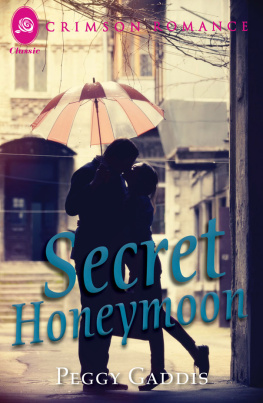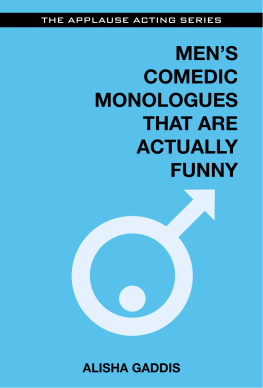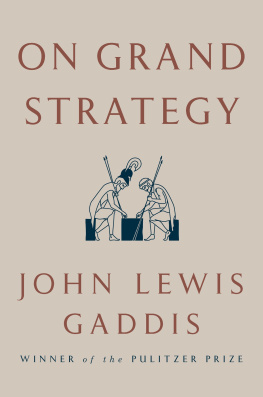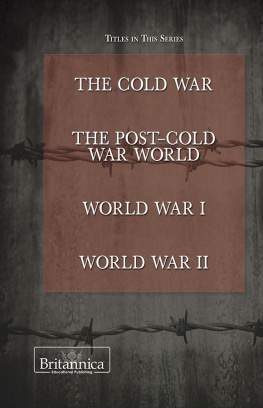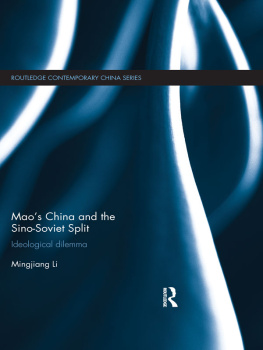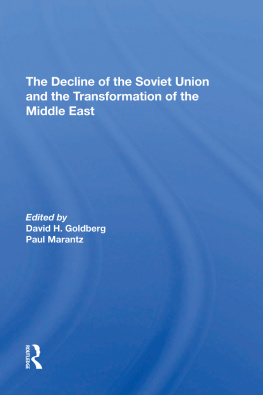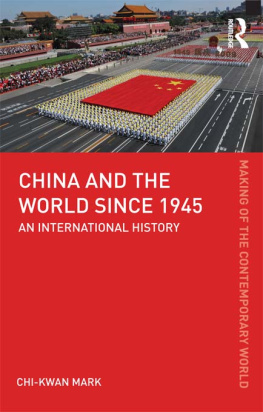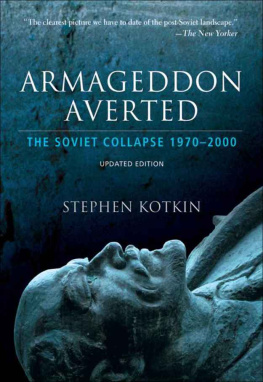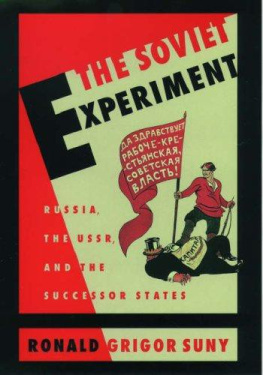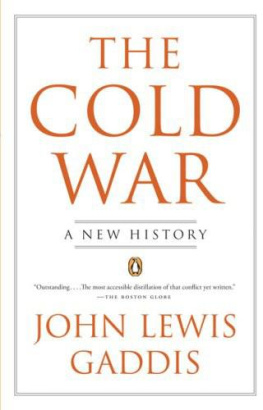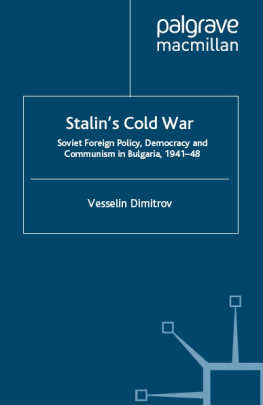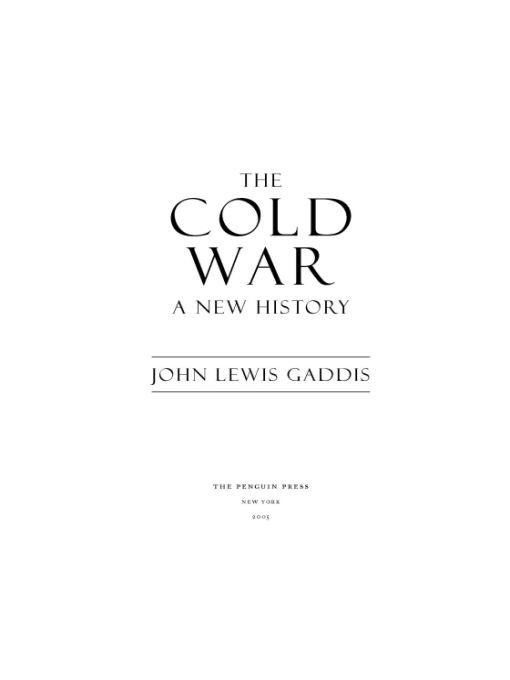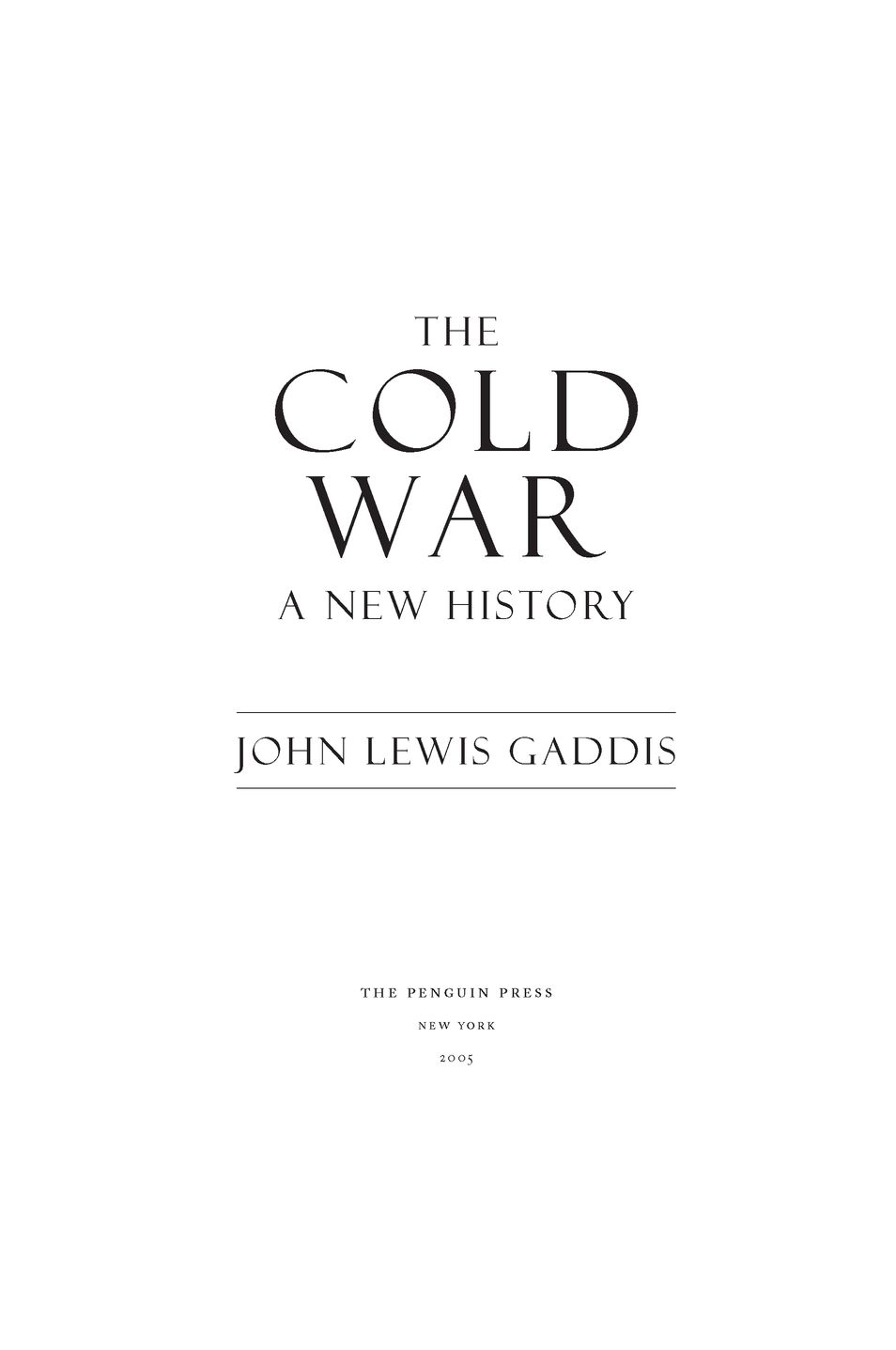Table of Contents
ALSO BY JOHN LEWIS GADDIS
The United States and the Origins of the Cold War, 19411947
Russia, the Soviet Union, and the United States: An Interpretive History
Strategies of Containment: A Critical Appraisal of
American National Security Policy During the Cold War
The Long Peace: Inquiries into the History of the Cold War
The United States and the End of the Cold War: Implications,
Reconsiderations, Provocations
We Now Know: Rethinking Cold War History
The Landscape of History: How Historians Map the Past
Surprise, Security, and the American Experience
IN MEMORY OF GEORGE F. KENNAN
19042005
PREFACE
EVERY MONDAY AND WEDNESDAY afternoon each fall semester I lecture to several hundred Yale undergraduates on the subject of Cold War history. As I do this, I have to keep reminding myself that hardly any of them remember any of the events Im describing. When I talk about Stalin and Truman, even Reagan and Gorbachev, it could as easily be Napoleon, Caesar, or Alexander the Great. Most members of the Class of 2005, for example, were only five years old when the Berlin Wall came down. They know that the Cold War in various ways shaped their lives, because theyve been told how it affected their families. Some of themby no means allunderstand that if a few decisions had been made differently at a few critical moments during that conflict, they might not even have had a life. But my students sign up for this course with very little sense of how the Cold War started, what it was about, or why it ended in the way that it did. For them its history: not all that different from the Peloponnesian War.
And yet, as they learn more about the great rivalry that dominated the last half of the last century, most of my students are fascinated, many are appalled, and a fewusually after the lecture on the Cuban missile crisisleave class trembling. Yikes! they exclaim (I sanitize somewhat). We had no idea that we came that close! And then they invariably add: Awesome! For this first postCold War generation, then, the Cold War is at once distant and dangerous. What could anyone ever have had to fear, they wonder, from a state that turned out to be as weak, as bumbling, and as temporary as the Soviet Union? But they also ask themselves and me: how did we ever make it out of the Cold War alive?
Ive written this book to try to answer these questions, but also to respondat a much less cosmic levelto another my students regularly pose. It has not escaped their attention that Ive written several earlier books on Cold War history; indeed, I regularly assign them one that takes almost 300 pages just to get up to 1962. Cant you cover more years with fewer words? some of them have politely asked. Its a reasonable question, and it came to seem even more so when my formidably persuasive agent, Andrew Wylie, set out to convince me of the need for a short, comprehensive, and accessible book on the Cold Wara tactful way of suggesting that my previous ones had not been. Since I regard listening to my students and my agent as only slightly less important than listening to my wife (who also liked the idea), the project seemed worth taking on.
The Cold War: A New History is meant chiefly, therefore, for a new generation of readers for whom the Cold War was never current events. I hope readers who lived through the Cold War will also find the volume useful, because as Marx once said (Groucho, not Karl), Outside of a dog, a book is a mans best friend. Inside a dog, its too dark to read. While the Cold War was going on it was hard to know what was happening. Now that its overand now that Soviet, East European, and Chinese archives have begun to openwe know much more: so much, in fact, that its easy to get overwhelmed. Thats yet another reason for writing a short book. Its forced me to apply, to all this new information, the simple test of significance made famous by my late Yale colleague Robin Winks: So what?
A word as well about what this book is not meant to be. Its not a work of original scholarship. Cold War historians will find much of what I say familiar, partly because Ive drawn a lot of it from their work, partly because Ive repeated some things Ive said in my own. Nor does the book attempt to locate roots, within the Cold War, of such postCold War phenomena as globalization, ethnic cleansing, religious extremism, terrorism, or the information revolution. Nor does it make any contribution whatever to international relations theory, a field that has troubles enough of its own without my adding to them.
I will be pleased, though, if this view of the Cold War as a whole produces some new ways of looking at its parts. One that has especially struck me is optimism, a quality not generally associated with the Cold War. The world, I am quite sure, is a better place for that conflict having been fought in the way that it was and won by the side that won it. No one today worries about a new global war, or a total triumph of dictators, or the prospect that civilization itself might end. That was not the case when the Cold War began. For all its dangers, atrocities, costs, distractions, and moral compromises, the Cold Warlike the American Civil Warwas a necessary contest that settled fundamental issues once and for all. We have no reason to miss it. But given the alternatives, we have little reason either to regret its having occurred.
The Cold War was fought at different levels in dissimilar ways in multiple places over a very long time. Any attempt to reduce its history exclusively to the role of great forces, great powers, or great leaders would fail to do it justice. Any effort to capture it within a simple chronological narrative could only produce mush. Ive chosen instead to focus each chapter on a significant theme: as a result, they overlap in time and move across space. Ive felt free to zoom in from the general to the particular, and then back out again. And Ive not hesitated to write from a perspective that takes fully into account how the Cold War came out: I know no other way.
Finally, I want to express my appreciation to the people who inspired, facilitated, and patiently waited for this book. They certainly include my students, whose continuing interest in the Cold War sustains my own. Im grateful also to Andrew Wylie, as I know future students will be, for having suggested this method of covering more years with fewer wordsand for having since helped several of my former students publish their own books. Scott Moilers, Stuart Proffitt, Janie Fleming, Victoria Klose, Maureen Clark, Bruce Giffords, Samantha Johnson, and their colleagues at Penguin showed admirable equanimity in the face of missed deadlines, and exemplary efficiency in producing this overdue book once it was done. It could hardly have been written at all without Christian Ostermann and his colleagues at the Cold War International History Project, whose energy and thoroughness in collecting documents from all over the world (on the day I write this the latest stash from the Albanian archives has arrived) have placed all Cold War historians in their debt. Last, but hardly least, I thank Toni Dorfman, who is the worlds best copy editor/proofreader and the worlds most loving wife.
The dedication commemorates one of the greatest figures in Cold War historyand a long-time friendwhose biography it will now be my responsibility to write.


